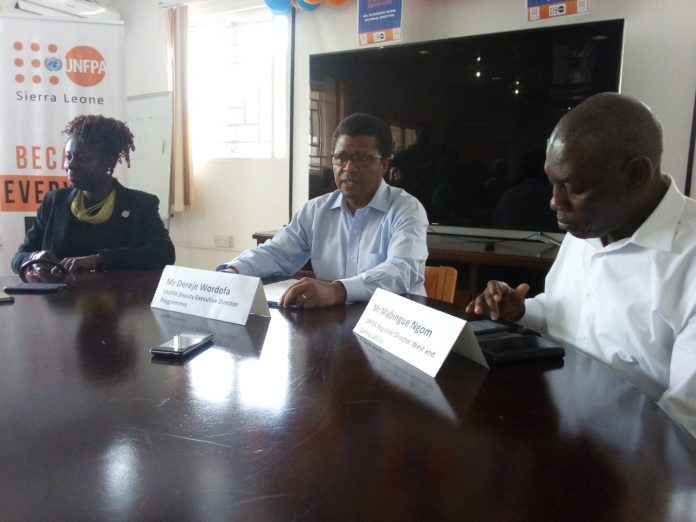
To observe 50 years of operations and 25 years of the International Conference on Population and Development (ICPD), Mr. Dereje Wordofa, the United Nations Assistant Secretary General United Nations Fund for Population Activities (UNFPA) Deputy Executive Director, Program on Friday 21st June 2019 at UNFPA Signal Hill Road, Congo Cross headquarters in Freetown informed the media that his organization wants universal access to sexual and reproductive health for women underlining that his visit to Sierra Leone is a success as it gave him the opportunity to interact with staff as well as implementing partners of its programs in the country.
He gave as example the Women in Crisis Movement that is working with disadvantaged women like girls who have dropped out of school, pregnant and lactating mothers, prostitutes and former fighters during the country’s civil war as well as the Aberdeen Women’s Center that is treating women affected by fistula.
Mr. Dereje Wordofa disclosed that he visited the Rokupa Government Hospital and observed that millions of women and girls in the country have been left behind in health, education, nutrition and sanitation for which their future is at stake revealing that he held productive discussions with President Julius Maada Bio at State House, the Minister of Foreign Affairs and International Cooperation, Mrs. Nabilla Tunis, UN Agencies and observed that the President is passionate about the human development and improving the lives of his people in addition to discussions with other stakeholders on how to end violence against women, the First Lady’s campaign to end child marriage and teenage pregnancy as well as for girls to stay and complete school.
Sierra Leone has made remarkable gains in the last few decades: the maternal mortality rate reduced from 2,630 (1990) to 1,360 (2015). Furthermore, the total fertility rate has decreased from 5.1 (2008) to 4.9 (2013). Adolescent fertility rate decreased from 146/1000 women aged 15-19 years to 125/1000. Adolescent child bearing has decreased from 34 % in women aged 15-19 years. The modern contraceptive prevalence rate has gone up from 7% (2008) to 15% (2013). Unmet need for family planning has dropped from 28% (2003) to 25% (2013).
Furthermore, millions of Sierra Leonean women have gained the power to make decisions about their own bodies, including whether, when, how often and with whom to become pregnant. This has been instrumental to moving the country to greater gender equality.
According to the UN Deputy Executive Director, “it is now 25 years since the International Conference on Population and Development (ICPD). Remarkable progress has been achieved but there are still millions of women and girls who have not benefitted from the promise of the IPCD. After 25 years, IPCD will be critical for the work we do serving women and girls around the world. We need to reenergize the movement, reconfirm our commitment and forge new partnerships to fulfill the promise of Cairo.”
The ICPD meeting in Cairo, Egypt was when 179 governments adopted a revolutionary Program of Action and called for women’s reproductive health and rights to take center stage in national and global development efforts. ICPD marked a revolution in thinking about sexual and reproductive health and rights.
The ICPD agenda for sexual and reproductive rights for all is now being challenged as never before. At the same time, the landmark agenda garners staunch support, including at the highest political levels due in part to its important contribution to accelerating the Sustainable Development Goals within the framework of Agenda 2030.
Mr. Dereje Wordofa further pointed out that a lot of gaps remain as some girls, 15 years and below, get pregnant that is not the norm, that 1 in 3 adolescents get pregnant that must stop, that UNFPA is advocating for zero preventable deaths, zero gender violence and Female Genital Mutilation lamenting that Sierra Leone has the highest infant mortality rate i.e. 1,360 per 100,000 with the latest figure being 2,630 while the global average is 2016 per every 100,000 and affirmed that this would require a lot of sensitization.
He enlightened that to actualize UNFPA objectives in the coming years, they would employ best practices, innovation and government’s commitment and informed that the unmet needs for family planning for women is 25% adding that this could imply that this proportion of women of reproductive age, who would like to control their own fertility, still do not use modern contraceptives for various reasons and informed that without access, women and girls lack the power to make decisions about their own bodies, including whether or not to become pregnant affirming that the lack of this power-which influences so many other facets of life: education, income, safety-leaves women and girls unable to shape their own future.
Child marriage is still prevalent in Sierra Leone. The 2013 Demographic and Health Survey states that 28% of adolescents between the ages of 15 and 39 had already begun childbearing and that 24% of those who are married had their first birth during the first year of marriage. To fulfill the promise of the ICPD in Sierra Leone, concrete commitments are needed by the government, donors and NGOs as the ICPD tells us all that now is the time to reenergize the movement to complete the unfinished business in Cairo.
On Thursday 20th June 2019, UNFPA Sierra Leone screened the award-winning documentary titled, the City of Joy directed by Madeleine Gavin.
The City of Joy follows the first class of female students at the leadership center located in the eastern part of the Democratic Republic of Congo, a region often referred to as the “worst place in the world to be a woman.”
The students have suffered abuse, including sexual and gender-based violence, during the 20-year war, and by attending the leadership center, they heal and become powerful voices of change for their country.
In the film, the women join the three founders of the center, Dr. Dennis Mukwege, 2018 Nobel Peace Prize laureate, play write and activist Eve Ensler and human rights activist, Christine Schuler-Deschryver, who creates a safe haven in the place they call City of Joy.
Screening of the film at the Lagoonda Entertainment Complex, Aberdeen in Freetown on Thursday 20th June 2019 was followed by a panel discussion on the topic “ICPD 25: What has Changed” moderated by Dr. Kim Eva Dickson, the UNFPA Country Representative in Sierra Leone with Mr. Dereje Wordofa, Ms. Diaka Koroma, Director and Founder, Girlz Empowered Sierra Leone and Dr. Kim Eva Dickson also as panelists.
Other contributors to the discussion included Dr. Joan Shepherd, Principal of the Midwifery School in Freetown, Patricia Bah, Head of the Teenage Pregnancy Secretariat in Freetown, Mr. Alpha Timbo, Minister of Basic and Senior Secondary Education and Alhaji Mohamed Bailor Jalloh, Executive Director of FOCUS 1000, a renowned local NGO. This was followed by the launch of the UNFPA State of the World Population Report 2019.




Many businesses allow employees to work remotely once or twice a week.
Many businesses require everyone to be in the same location working together for specific
reasons. A business that does not normally find it conducive to have people work remotely, should have an emergency plan in place for an unexpected event that makes it necessary. https://americanreceivable.com/is-your-company-prepared-for-an-emergency/